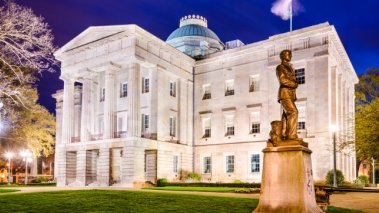Table of Contents
Campus free speech bill becomes law in North Carolina

House Bill 527, the North Carolina legislation aimed at improving protections for free speech on public college campuses in the state, became law yesterday. The bill garnered bipartisan support, passing the state’s Senate 34-11 and the House of Representatives 80-31.
Sponsored by Reps. Christopher Mills and Jonathan Jordan, the legislation includes several important provisions that will better protect campus free speech.
HB 527 helps ensure students aren’t punished for distributing literature in outdoor areas on campus. As FIRE’s most recent “Spotlight on Speech Codes” report shows, roughly 1 in 10 colleges maintain problematic policies that restrict expression to certain areas on campus, oftentimes called “free speech zones.” These misleadingly labeled “free speech zones” are routinely struck down by courts because they unconstitutionally limit student expression to tiny, out of the way areas of campus. Statutorily prohibiting these zones will hopefully avoid the need for litigation over this issue in North Carolina.
The law also requires institutions to create a range of sanctions for any person under its jurisdiction who “substantially disrupts the functioning of the constituent institution or substantially interferes with the protected free expression rights of others … .” The substantial disruption standard is necessary to ensure that fleeting boos, for example, (which constitute protected speech) remain protected, while conduct that materially disrupts or otherwise silences others remains actionable.
The language of this law is different from laws or bills in other states requiring specific mandatory minimum sanctions for students who materially disrupt the free expression of others. Instead, this law reminds institutions that they have an obligation to take action when people engage in conduct that silences their opponents on campus, while giving institutions the flexibility to evaluate each case in its individual context. This helps to ensure that those who shout down a campus speaker aren’t required to be treated the same as those who physically assault a speaker.
HB 527 also states that colleges and universities “may not take action, as an institution, on the public policy controversies of the day in such a way as to require students, faculty, or administrators to publicly express a given view of a social policy.” This language prevents institutions from taking positions on controversial issues in a way that forces others to conform to their view. For example, if an institution felt that marijuana should remain illegal, it could say so, and it could also require students to avoid its use on their campus. But the school could not force students, faculty, or administrators to publicly agree that marijuana should remain illegal. While institutions rarely overtly try to force constituent groups to take positions that conform to the school’s viewpoints, the problem is not unheard of. This law will prevent such an occurrence in North Carolina.
FIRE is happy to see that these new statutory protections will help better protect student and faculty expression in North Carolina.
Recent Articles
FIRE’s award-winning Newsdesk covers the free speech news you need to stay informed.

BREAKING: New Title IX regulations undermine campus free speech and due process rights


Stanford president and provost cheer free expression in open letter to incoming class
